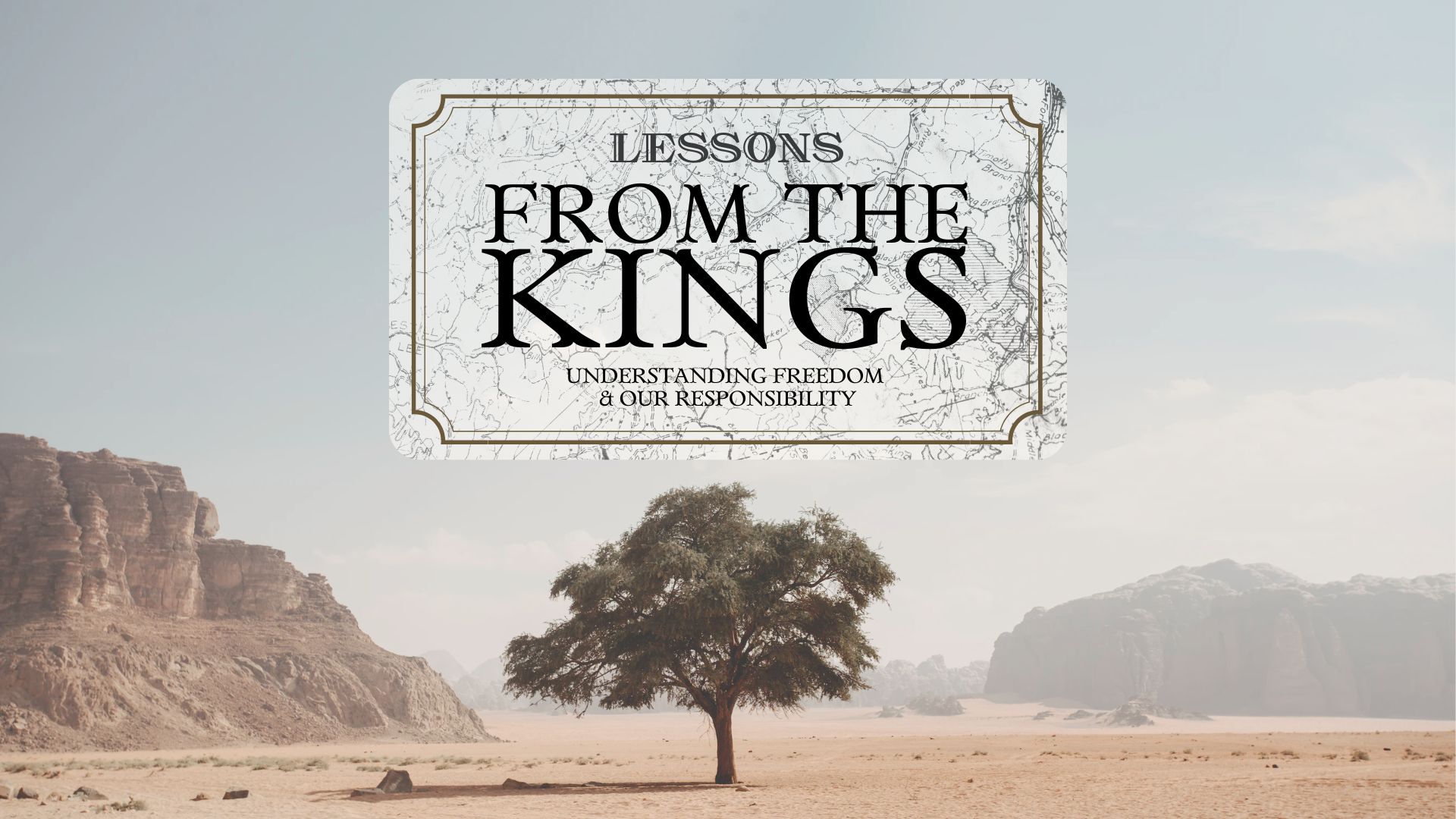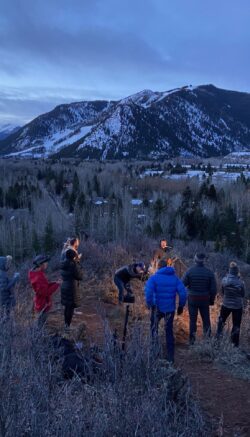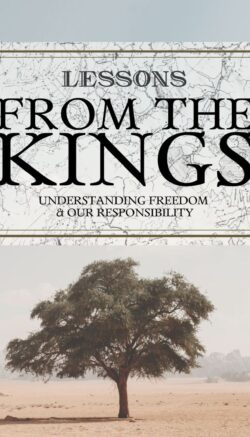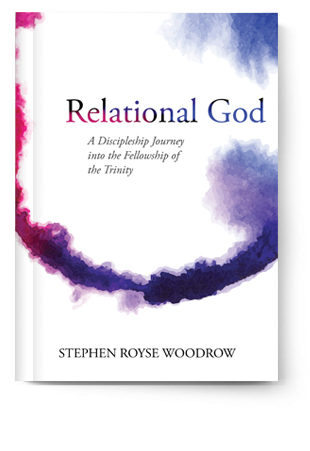 Welcome to those who are just checking things out, not sure about Jesus yet – I ask you to really think about what reality you are aligning your soul to? Either this world and all of its uncertainty or to Jesus and the resurrection of life, with the promise of eternal life.
Welcome to those who are just checking things out, not sure about Jesus yet – I ask you to really think about what reality you are aligning your soul to? Either this world and all of its uncertainty or to Jesus and the resurrection of life, with the promise of eternal life.
Remind them why I am doing this series going over big swaths of the OT and tying it to the NT, because we need to hold onto the entire Bible in the midst of a time when people are leaving it as the authority, realizing Jesus can’t be our authority unless His Word is our authority otherwise we can make God into our own image.
The kingdoms of the kings rose and fell according to how they honored God’s house.
David the man after God’s own heart is the one who desired to build a temple for God – breakdown the connection – if my heart is after God’s heart I am going to want to be with God and be with others with God – I am going to want to be close never far from the household of God and a builder of it – use this as an opportunity to encourage our locals and seasonal folks in their roles.
So for David, the symbol, the center of God’s presence with His people so far had been the ark of the covenant, so David put his mind to get it centrally located among the people.
For David, the presence of God was of utmost priority, because this was the natural overflow of being a man after God’s heart. Ps 84
Ps 69;9, John 2:17, Zeal for your house has consumed me.
We need some stirring for some zeal again for the house of God.
LESSON SEVEN:
Verses: 2 Samuel 6-7, Psalm 84, Ephesians 2:18-22, 1 Timothy 3:14-15, Hebrews 12:18-29
People after the heart of God desire to enjoy the presence of God and work to build the household of God where heaven and earth come together.
2 Samuel 6
“How can the ark of the Lord come to me?”
If God is going to break out like this because of His commandments not being obeyed and because of His justice and righteousness, how can God dwell with man on earth?
A heart for God is a heart for His house
The kingdoms of the kings rose and fell according to how they honored God’s house.
Oh, the only answer to this is the glorious Gospel of Jesus Christ. He has made the sacrifice sufficient for us to enjoy the presence of God so that we now have access right into the holy of holies for He has torn the veil.
The next time, David and the priests stopped every six feet to sacrifice and followed the law that God had given for moving the ark
2 Samuel 6-7, David and the Lord’s covenant, David’s heart to build a temple for God and bring the ark into it,
David and Michal – And here we can see this contrast between David’s wife Michal and himself, he is the man after God’s own heart in the way he worshipped, why is this contrast reversed so much today between husbands and wives – Ps 84:4, we have embraced a lie today that stoicism is more spiritual and trusted expression of worship and faith
2 Samuel 7:5
“Thus says the Lord: Would you build me a house to dwell in?”
2 Samuel 7:11
“Moreover, the Lord declares to you the Lord will make you a house.” 7:11
Psalm 84
“How lovely is your dwelling place O Lord of hosts! My soul longs yes faints for the courts of the Lord; my heart and flesh sing for joy to the living God…Blessed are those who dwell in your house, ever singing your praise…For a day in your courts is better than a thousand elsewhere I would rather be a doorkeeper in the house of my God than dwell in the tents of wickedness.”
David had this heart, but Michal did not and therefore was fruitless.
Ephesians 2:18-22
God through Jesus is building His Church today, His household.
Hebrews 12:18-29,
“Therefore, let us be grateful for receiving a kingdom that cannot be shaken, and thus let us offer to God acceptable worship, with reverence and awe, for our God is a consuming fire.”
The importance of place: now because of the Spirit indwelling believers and the Church the dwelling place of God is in our hearts and among us as we gather together wherever that is.
Use this view of the temple and presence to connect to NT, the temple now, is the body but our individualistic western mentality has isolated it from the larger temple household of God, the family of God, 1 Tim. 3:14-15, the household of God, the church of the living God, a pillar and buttress of the truth.
1 Chron 13
David brought ark up without Levites and Uzzah was killed
13:17, “And David was afraid of God that day and he said, How can I bring the ark of God home to see?’
1 Chron 15:
The Lord chose the Levites to carry the ark along with other rules that David did not follow resulting in Uzzah being killed
1 Chron 17
Davids desire to build a temple
LESSON EIGHT:
Verses: 2 Samuel 24, 1 Chronicles 21, Matthew 16:18-19, Ephesians 6:10-12
God’s plan is always bigger and better than we can perceive, and Satan and the world are at war against the household of God and His plan.
2 Samuel 24
It was the Lord who was angry against Israel – reason not given led him to incite David to count Israel – could this be because they were acting like other nations and not honoring His presence and the ark of the covenant as their central trust rather than the strength and might of David’s army? Could it be that they had lost their first love in the midst of the peace and blessing that David’s leadership brought.
There was a connection with military and the census, since Joab was commanded and the result was fighting men, this seems to imply a lack of trust in God
1 Chronicles 21
Why did Satan entice David? Why did Satan come against Israel? He knew this was God’s chosen nation and David was special and the temple, presence of God and ark would come to rest there, Is the angel of the Lord the pre-incarnate Jesus? guarding the place, Ornan’s threshing floor where the future site of the temple would be David sees him standing between earth and heaven standing watch over the future place of the temple –
1 Kings14:21
Jerusalem, the city that the Lord had chosen out of all the tribes of Israel, to put his name – it is where Jesus will return, it is where the new Jerusalem will descend, it is Zion the city of God
I believe there will be a rebuilding of the temple by the Jews in an effort to start sacrifices and a renewal of the presence of God, and it will be this effort and event that will launch the end times, and it will be this effort that will lead them to the lamb of God ultimately.
Matthew 16:18-19
Jesus is the builder of the Church, not man. And He has given us the keys to the kingdom, spiritual resources we are to build with rather than like David fall back into trusting our know-how and what we can accomplish with best-practices, metrics, and business practices etc.
The problem with counting, just like in the church, crowd management can easily distract from focusing on what God’s heart is about – presence, holiness, transformation etc.
1 Chron 21 Davids great sin of numbering Israel, why was this so angering to God, God in this sin though led David to buy the threshing floor or Ornan which became the place of the temple
1 Chron 22:1, God confirmed temple mount, here and that this would be the future place of the temple and His sacrifice
But why was the numbering of Israel so abhorrent to God? 1 Chron 21:1, says that Satan himself stood against Israel and incited David to number Israel
This figure Satan, used 3 times in OT Job 1:12, 2:6, Zech 3:1-2 but here it is with the article so seems to be a personal name
Ephesians 6:10-12
Oh the consequences of spiritual warfare and the importance of who we are listening to and being led by.
What reality are you aligning your soul with?
God’s plan is always bigger and better. Thankfully He is sovereign even over the evil forces.
1 John 5:18-19
Jess holds us securely from the evil one in the midst of the world which is under the control of the evil one.
This concluding chapter also serves as a fitting climax to 1, 2 Samuel, for it simultaneously links David with the best of Israel’s past and the glory of their future. By sacrificing burnt offerings provided for him in the very area where Abraham had once done the same (cf. Gen 22:13; cf. 1 Chr 3:1), David’s life and ministry become identified with the greatest of the Torah patriarchs. By acting as an intercessor to bring a divinely sent plague to a halt, as Aaron once did (Num 16:47–49), he assumes the status of a priest and thus foreshadows the priestly actions of Jesus, the ultimate Davidic priest. By acquiring the site of the Lord’s temple for Israel, David also lays the groundwork for the most celebrated material aspect of Israelite religion.
Bergen, R. D. (1996). 1, 2 Samuel (Vol. 7, p. 474). Broadman & Holman Publishers.
In order to bring judgment against Israel, the Lord “incited David” to “take a census of Israel and Judah.” The writer’s attribution of the action to the Lord is not contradictory to 1 Chr 21:1; it reflects his understanding that Yahweh is Lord of the universe, exercising dominion over all powers and authorities, whether in heaven or on earth (cf. Ps 97:9; Eph 1:20). From this position of utmost strength the Lord apportions power to lesser beings to be used in enforcing the moral aspects of the created order. The Bible teaches that God empowers even destructive beings—whether superhuman (cf. 1 Kgs 22:19–23; 2 Thess 2:11) or human (cf. Judg 1:14; Hab 1:6; Acts 4:28)—in limited ways to bring judgment and, ultimately, redemption. In the present case the Lord used both superhuman and human beings to enforce the moral order, enabling Satan to entice David to act foolishly so as to bring judgment on Israel.
Bergen, R. D. (1996). 1, 2 Samuel (Vol. 7, pp. 474–475). Broadman & Holman Publishers.
The fact that the Lord oversees the entire judgment process is ultimately a comfort to humanity. It means that no malevolent action can occur that is not subject to God’s oversight and divinely imposed limitations. It also means that nothing can occur in the universe that God cannot ultimately use for good (cf. Gen 50:20; Acts 2:36; Rom 8:28).
Bergen, R. D. (1996). 1, 2 Samuel (Vol. 7, p. 475). Broadman & Holman Publishers.
What then created the problem in this census? It was either David’s motivation for the census or the manner in which it was carried out. Perhaps it was undertaken for purposes of self-aggrandizement54—David may have wanted to “know how many” Israelite males above the age of twenty there were in Israel in order to be able to boast more accurately. Alternatively, it may be that David did not require all enrolled males to pay the half-shekel ransom required by the Torah (cf. Exod 30:13–16), an oversight guaranteed to bring a plague against Israel. Speaking in favor of this second option is the fact that on a previous occasion, David had failed to enforce Torah regulations for an otherwise permissible action—transporting the ark of the covenant—with disastrous actions (cf. 6:7).
“Joab” (v. 3) was clearly troubled by the king’s order and openly questioned it when it came. While expressing the wish that the Lord might “multiply the troops a hundred times over” during David’s lifetime, Joab was convinced—perhaps based on the Torah warning (Exod 30:12)—that ascertaining the number of Israelite soldiers would automatically endanger them.
In spite of Joab’s public misgivings about the project, “the king’s word … overruled Joab and the army commanders” (v. 4). Thus David’s leading officers set about the daunting task “to enroll the fighting men of Israel.”
Bergen, R. D. (1996). 1, 2 Samuel (Vol. 7, pp. 475–476). Broadman & Holman Publishers.
but in the case of David, the sin appears to lie in self-sufficient pride, the very opposite of the attitude that typified him in the psalm of 2 Samuel 22 and in his ‘last words’ of 2 Samuel 23. Accepting that David lapsed here and acknowledged his fault, we return to verse 1 and ask what the narrator was wanting his readers to grasp from his thought-provoking way of introducing the incident. Was he not drawing attention to the mysterious way in which God’s plan for human history takes in even the lapses of God’s servants?
Baldwin, J. G. (1988). 1 and 2 Samuel: An Introduction and Commentary (Vol. 8, pp. 315–316). InterVarsity Press.
It is important to recognize here also that regardless of what or who “incited” David to take the census, he is held accountable for the action, which is judged as sin (cf. also v. 17).
Thompson, J. A. (1994). 1, 2 Chronicles (Vol. 9, p. 162). Broadman & Holman Publishers.
An interesting difference between the accounts in Chronicles and Samuel is that in 2 Samuel 24 God himself gives the command to David whereas here it is the angel of the Lord who orders the prophet Gad to tell David to build an altar on the threshing floor of Araunah.
Thompson, J. A. (1994). 1, 2 Chronicles (Vol. 9, p. 162). Broadman & Holman Publishers.
The plague was lifted, the angel returned his sword to its sheath, and the site for the temple had been determined. The Chronicler now gives an explanation of why the center of worship in Israel could be moved from Gibeon to Jerusalem. Through the centuries continuity had been preserved. The worship at the altar of the Mosaic tabernacle (cf. Lev 9:24) gave way to the worship at Gibeon and finally at the Jerusalem temple. Thus David could declare, “The house of the Lord God is to be here, and also the altar of burnt offering for Israel.” Furthermore, in 2 Chr 3:1 we are told that this site was none other than Moriah, the place where Abraham offered his son Isaac as a sacrifice (Gen 22:2). Many years later Jesus would die in Jerusalem on Calvary, completing the work of atonement and defeating Satan “once for all” (Heb 7:26–28; Col 2:15). The events that led to the choice of this place were of God’s doing. This was the place where divine wrath and divine mercy would meet.
Thompson, J. A. (1994). 1, 2 Chronicles (Vol. 9, p. 163). Broadman & Holman Publishers.
In the act of taking the census of a people, there is not only no evil, but much utility. But numbering Israel—that people who were to become as the stars for multitude, implying a distrust of the divine promise, was a sin; and though it had been done with impunity in the time of Moses, at that enumeration each of the people had contributed “half a shekel towards the building of the tabernacle,” that there might be no plague among them when he numbered them (Ex 30:12). Hence the numbering of that people was in itself regarded as an undertaking by which the anger of God could be easily aroused; but when the arrangements were made by Moses for the taking of the census, God was not angry because the people were numbered for the express purpose of the tax for the sanctuary, and the money which was thus collected (“the atonement money,” Ex 30:16) appeased Him. Everything depended, therefore, upon the design of the census [Bertheau]. The sin of David numbering the people consisted in its being either to gratify his pride to ascertain the number of warriors he could muster for some meditated plan of conquest; or, perhaps, more likely still, to institute a regular and permanent system of taxation, which he deemed necessary to provide an adequate establishment for the monarchy, but which was regarded as a tyrannical and oppressive exaction—an innovation on the liberty of the people—a departure from ancient usage unbecoming a king of Israel.
Jamieson, R., Fausset, A. R., & Brown, D. (1997). Commentary Critical and Explanatory on the Whole Bible (Vol. 1, p. 260). Logos Research Systems, Inc.
LESSON NINE:
Verses: 1 Kings 8, 2 Chronicles 5-7, James 4:5-10
“If my people who are called by my name humble themselves, and pray and seek my face and turn from their wicked ways, then I will hear from heaven and will forgive their sin and heal their land.” (2 Chronicles 7:14)
Within these verses we can see several issues we could call house cleaning, reseting the Church to honor the household of God.
1 Kings 8:27
Solomon brings ark into temple
“But will God indeed dwell on the earth? Behold heaven and the highest heaven cannot contain you, how much less this home that I have built?”
2 Chronicles 5-7
2 Chronicles 3:1 Mt Moriah also when Abraham and Isaac, the place where divine wrath and Divine mercy would meet
2 Chron 5:3 – ark brought up into temple on feast of tabernacles, Jesus has fulfilled the first four Spring feasts at His first coming and will fulfill that las three in the fall when He returns, culminating with His grand purpose of uniting all things in heaven and earth together.
2 Chron 6:18-21, “But will God indeed dwell with man on the earth? Behold, heaven and the highest heaven cannot contain you, how much less this house that I have built” access through prayer, is location, place important? Worship was central to God’s people, Jerusalem chosen by God.
2 Chronicles 6:32-33
At the core of the temple is God’s heart for all people of all nations to see His presence and power in His temple, his household and honor Him.
Pretty amazing passage about God’s purpose and heart for all people even in the midst of working specifically with Israel.
The fact that this was the only temple of all nations in which the true God was worshipped imparts a moral grandeur to the scene and prepares the mind for the sublime prayer that was offered at the dedication. The pure theism of that prayer—its acknowledgment of the unity of God as well as of His moral perfections in providence and grace, came from the same divine source as the miraculous fire
Jamieson, R., Fausset, A. R., & Brown, D. (1997). Commentary Critical and Explanatory on the Whole Bible (Vol. 1, p. 269). Logos Research Systems, Inc.
2 Chron 7:1-3
Fire, glory, presence, filling, pentecost, the people saw the fire come down, at Pentecost the fire came down and consumed people as tongues of fire, as Romans 12 says, to be a living sacrifice – consumed by the fire of God’s presence.
Should we expect today a manifestation of God’s presence and power in His household? This is a big question for believers and the Church today?
A healthy church is always getting ready to steward revival, which at the center is an honoring of the presence of God in our bodies and in the household of God the Church
Big issue: Solomon and the people expected God to manifest His presence among them, not just religious routine, do we expect the fire of the Spirit to come upon us and His presence or just routine?
2 Chron 7:3
Prayer at the heart of worship, “For He is good for his steadfast love endures forever. – what is the origin of this worship statement and process?
2 Chron 20:21, Ezra 3:11, Neh 12:24, Ps 100:5, 106:1, 107:1, Ps 118:1, Jer 33:41, Ezek 36:11, Ps 136:4-26
2 Chron 7:3, For he is good, for his steadfast love endures forever. (1 C 16:34, 41, 2 C 7:3, 20:21, Ezra 3:11, Ps 100:5, 106:1, 107:1, 118:1, 136:1, Jer 33:11
Deal with these big heart issues for experiencing his presence, believing God is good even in discipline and trauma and war and pestilence etc and believing, we can question God’s ways but to question his character is a whole and to also believe in his faithfulness to his covenant promises and steadfast love, without this faith wanes and falters. When we are down and struggling is when we need to engage the church and worship and restore our faith and hope in His goodness and love.
Two key requirements for worshiping God and enjoying His presence: we met come to him, the only one who is truly good (refer to Jesus’ words) and believe He is love, heed faithful to His covenant throughout the ages. This might be a good ministry time – breaking through people’s doubts of His goodness and sovereign faithfulness and love.
2 Chron 7:4
David dancing before the Lord, and Solomon’s incredible sacrifices, 22,000 oxen and 120,000 sheep – what do we know of extravagant worship before the Lord, shoot for most of America church is optional and most look at this like Judas’ heart toward the woman who poured out the alabaster of oil, that it should have been given to the poor.
2 Chron 7:6
1 Chron 25
David set up the muscicians, Asaph and other who prophesied with lyres, with harps, and with cymbals – so there is a merging of prophesy and leading people into worship – we are not just singing songs, we are ministering to the Lord, which is prophesying
2 Chron 7:14
If my people who are called by my name…
2 Chronicles 7:14
Focus on 2 Chronicles 7:14 as it applies today to the Church laying the foundation of the temple from David to Solomon to 70 AD and the Church’s role today leading to the new heavens and earth
Ask them what the role of the preacher is?
Lead them to see that it is to equip them for ministry, the whole counsel of God, all that is right, but it is to bring us all under the conviction of the Holy Spirit and Word of God, but what about encouragement – yes, but to come into the presence of God and to draw closer requires humility, contrite in Spirit and tremble at his Word, that is the one God says He will look upon, Is 66:2, Is 64:1-2 and James 4:5-10, “Or do you suppose it is to no purpose that the Scripture says, ‘He yearns jealously over the spirit that he has made to dwell in us? But he gives more grace. Therefore, it says, God opposes the proud but gives grace to the humble. Submit yourselves therefore to God. Resist the devil, and he will flee from you. Draw near to God and he will draw near to you. Cleanse your hands you sinners, and purify your hearts, you double-minded. Be wretched and mourn and weep. Let your laughter be turned to mourning and your joy to gloom. Humble yourselves before the Lord, and he will exalt you.” Jesus’ words in the sermon on the mount, all with goal of bringing people under conviction so they could receive grace, 6:29-30, Jesus is serious about how intensely we are to fight sin.
Conviction is of things we need to stop doing and conviction of things I am not doing I need to do – thoughts and actions.
How do we get more grace and get God’s attention – James 4:5-10
Humbling often involves fasting in the scriptures
Until this conviction and humility happens within the Church, we will not be united and able to see God heal our land – this promise stands for the Church today no matter what nation they find themselves in.
Revelation 2:4-5, Jesus tells the church in Ephesus to repent or He will remove their lampstand! They were told by Jesus they had lost their first love – it is pretty evident in how the church worships their God.
2 Chronicles 7:15, 16, 19
How does Jesus fulfill this, not only the destruction but the future return to reign within the new covenant. How can the old temple inform us about the new covenant and the promises for the church and future new jerusalem – zion
1 Kings 11:1-8
Sadly, King Solomon did turn away from the Lord and the presence of the Lord left Israel. The rest of the story of the kings is some seasons of renewal, but overall a movement toward judgment and exile into Assyria and Babylon.
Later Solomon did worship other gods (1 Kings 11:4–8), as did many of his successors, so the nation was exiled (2 Chron. 6:36; 36:17–18, 20) to Babylon and the temple destroyed (36:19). Everyone who would witness the desolation of the land and the temple would know that it was a mark of God’s judgment on His people because of their sin (7:21–22)
Merrill, E. H. (1985). 2 Chronicles. In J. F. Walvoord & R. B. Zuck (Eds.), The Bible Knowledge Commentary: An Exposition of the Scriptures (Vol. 1, p. 626). Victor Books.
The opportunity chosen to move the ark to its final resting place was the time of the festival of the seventh month, the Feast of Tabernacles. According to 1 Kgs 6:38, the temple actually was completed in the eighth month of Solomon’s eleventh year. The dedication must have taken place during the month before the actual completion of the work. The seventh month is designated by its old Canaanite name in 1 Kgs 8:2, “Ethnaim,” the later “Tishri.”
Thompson, J. A. (1994). 1, 2 Chronicles (Vol. 9, p. 222). Broadman & Holman Publishers.
Tell the story and importance of the shekinah glory of God, and when it left everything was different leading up the 70AD and the new temple and the coming temple, this starts with the ark being taken during the beginning of Samuels ministry
5:13 (7:3) “for he is good, for his steadfast love endures forever.”
The quotation from the Psalms (v. 13b) encapsulates in a sentence what the entire temple project was about, that over the years since God’s first promise to David (1 Chr. 17:12), God’s faithful love (Heb. ḥesed) had ensured the project’s success. Underlying the temple was the person of God: He is good. That is why he responds to Israel’s worship with what later Jews called the shekinah glory (vv. 13c–14). Both in the case of the cloud and the glory filling the temple, the associations with Moses are very close (especially Exod. 40:34–35). Clouds are a particularly rich biblical symbol of God’s presence (e.g. Exod. 13:21–22; Dan. 7:13; Acts 1:9), emphasizing his mystery and majesty. The temple could never belong to humankind, not even to priests who, though they had sanctified themselves, now found it quite impossible to carry out any of their prescribed tasks.
Selman, M. J. (1994). 2 Chronicles: an introduction and commentary (Vol. 11, p. 336). InterVarsity Press.
Solomon responds to God’s glory (6:1–2). This brief statement, which is part testimony and part prayer, evokes a sense of wonder that the same God whose glory fills the temple (5:13–14) also dwells in ‘thick darkness’ (v. 1, nrsv, rsv, reb, neb). This latter phrase is associated with the cloud of God’s mysterious presence at Mount Sinai (Exod. 20:21; Deut. 5:22) and with his appearing on the Day of the Lord (Joel 2:2; Zeph. 1:15). Solomon is amazed that this intangible, sovereign deity whose mystery is symbolized by the darkness of the windowless Holy of Holies now promises to dwell in this temple (v. 2). The theme of God’s dual residence cascades through the chapter, without ever being logically resolved. It is enough to know that God lives on earth as well as in heaven. Even though the temple is ‘exalted’ (nrsv, rsv, KB; cf. reb, neb), it cannot physically contain God any more than he can be confined by human philosophy. And yet anyone can approach him in prayer (vv. 18–40).
Selman, M. J. (1994). 2 Chronicles: an introduction and commentary (Vol. 11, p. 339). InterVarsity Press.
0




